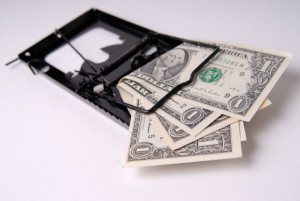 According to US News, graduates from the class of 2013 averaged just under $30,000 in student loan debt. This is a lot of money considering the average graduate from that same class had a starting salary of just around $45,000. While it may seem like an impossible task to pay back these loans, if you make smart decisions about your finances you can slay the startling student loan dragon and avoid the student loan money trap. The following tips will help you pay off your student loans and avoid the crippling debt after graduation that many recent graduates deal with.
According to US News, graduates from the class of 2013 averaged just under $30,000 in student loan debt. This is a lot of money considering the average graduate from that same class had a starting salary of just around $45,000. While it may seem like an impossible task to pay back these loans, if you make smart decisions about your finances you can slay the startling student loan dragon and avoid the student loan money trap. The following tips will help you pay off your student loans and avoid the crippling debt after graduation that many recent graduates deal with.
1. Know Your Loans
If you are like most graduates who have taken out student loans, it is crucial to know the ins and outs of them. You should know your monthly payment, interest rate, and the term of your loan. Knowing this information will ensure that you don’t fall behind on your payments and will allow you to come up with a game plan to pay them back. It is also smart to stay in touch with your student loan servicer. These people can help you if you need more time making a payment, want to change the terms of your loan, or want to explore options that may reduce your interest rate.
2. Refinance
Just like you can refinance your mortgage or car loan, it is also possible to refinance your student loans. You can usually consolidate and refinance your loan or loans into one single loan with a private lender. Because many graduates now have steady jobs and a better financial standing, the private lenders who deal with refinancing may offer much better rates than the initial loan. Refinance rates start as low as 1.90% for those with a very respectable credit score though most borrowers’ rates average around 3-5%. Even if you can lower your loans by a few percentage points, you will save thousands in the long run!
3. Student Loan Forgiveness
Student loan forgiveness is essentially just what it sounds like. After a certain amount of time or under certain circumstances, you are “forgiven” for your loans and are no longer required to make payments on any remaining balance. One of the most popular plans is the Public Service Loan Forgiveness Program from the Department of Education. This plan offers forgiveness for those who work in a public sector job, like the government or a not-for-profit, who have made at least 120 qualifying payments on their student loans. Starting in 2017 you can apply for this program on the Department of Education’s website.
4. Maintain a Budget
Whether you have student loans or not, it is essential to maintain a strict budget. Mapping out all of your essential expenses and sources of income will allow you to have a better understanding of how much you can invest or save and how much extra spending money you have. There are also countless apps to help you easily track your budget and spending. Make sure to keep updating your budget as you gain a better understanding of how much money you are spending.
5. Cut Unnecessary Expenses
There are countless ways to waste money in today’s society. In order to stay debt-free as you enter the “real world” you must identify and eliminate these wasteful habits. Some examples of expenses you can cut include eating out, memberships to entertainment services like Spotify or Netflix, and spending money at bars or clubs. Once you take a look into your budget and spending habits, you should be able to choose which expenses are unnecessary and cut them out.
________________________________
Today’s guest post is from Molly Day, the creator of StudentLoanDiary.com. Molly created her blog to help her stick to her goals and encourage other people to beat their student loan debt! Molly is working to pay off $30,000 in student loan debt over the next two years!
